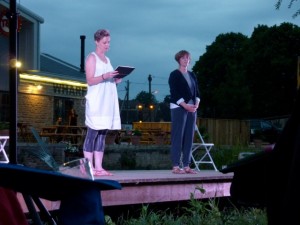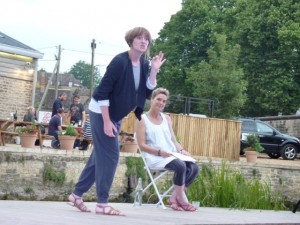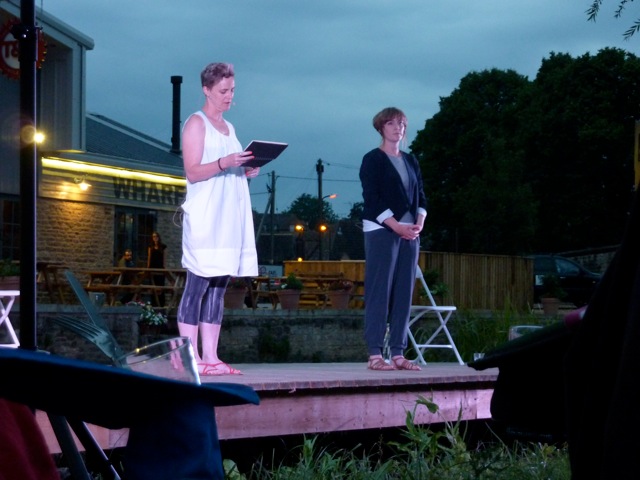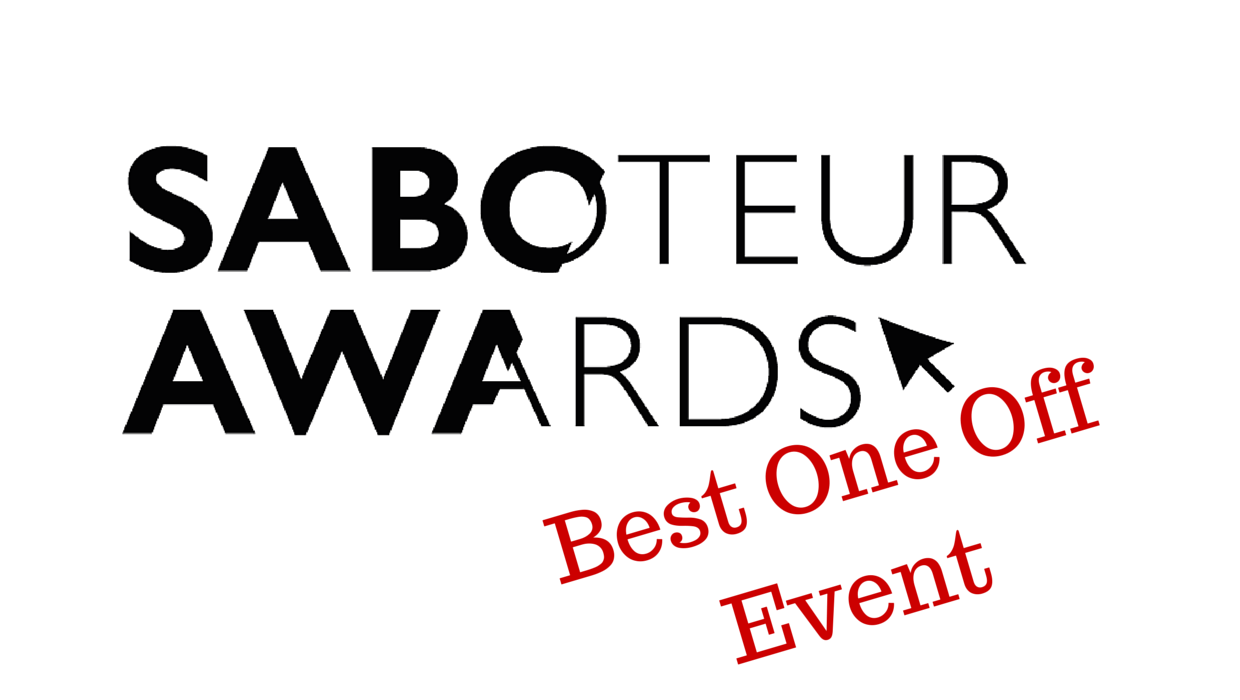Riverlands feat. Jo Bell and Jo Blake Cave (Oundle International Festival, 12 Jul 15)
reviewed by Jayne Stanton
 THE VENUE: Oundle Wharf, on the bank of Northamptonshire’s River Nene. Few sites could be more apt to stage this river’s stories. And what stage could be more fitting than a landing stage?
THE VENUE: Oundle Wharf, on the bank of Northamptonshire’s River Nene. Few sites could be more apt to stage this river’s stories. And what stage could be more fitting than a landing stage?
THE VIBE: The Wimbledon Men’s Final conveniently done and dusted, festival-goers crossed the river bridge equipped with folding chairs and blankets to bag their spot, make for the Tap & Kitchen bar restaurant before settling with drinks and snacks (an earlier email: No picnicking, please). Despite thistles underfoot and a preponderance of flying beasties, the atmosphere was relaxed and jovial (doubtless oiled by the offer price on bottles of the house wine), effervescent, even (the popping of bottle stoppers punctuating Artistic Director Kenneth Richardson’s words of welcome).
Any passing traffic on the road behind was soon forgotten with the performance underway; moreover, evening birdsong enhanced the setting.
REVIEWER’S DISCLOSURE: Jo Bell: UK Canal Laureate; former Director of National Poetry Day; award-winning poet in her own right; social media mover and shaker/giver/mediator – there’s lots more (I am biased). And the lure of original and traditional music from/inspired by Northants? Music to a folk fiddler’s ears.
PERFORMERS:
Jo Blake Cave: storyteller
Jo Bell: poet
Accompanied by:
Gregg Cave: guitar and vocals
Nick Ellison: fiddle
I’d assumed the performance would be a fusion of storytelling, music and poetry, rather an evening of two halves, but I was not disappointed. Jo Bell opened with ‘Raising the Roof for Kirsty’, a poem from her recently-launched second collection, Kith (Nine Arches Press). Audience participation was called for: “The roof is finished/The roof is finished”.
Jo Blake Cave followed with a ‘Story of Three’, based around local landmark Rushton’s Triangular Lodge. A tale of trickery; the three bags of gold, lucky for some (the fiddle player and his wife; cue music). Local musicians Nick Ellison, from Ravensthorpe, and Gregg Cave, originally from Lamport, finished the first half with a mix of traditional and self-penned folk songs. From Old England, Grown New, these words:
There’s a flame in my heart
that refuses to die.
It is born of this land,
it is in you and I.”
A set of fiddle tunes by Northamptonshire’s very own John Clare made my fiddle fingers dance.
Jo Bell closed the first half with another poem, ‘Lifted’, also from Kith. It echoed a line from one of the earlier songs, ‘Down the Bright Stream’: “For every lock, there’s a story told.”
Written by Jo Blake Cave and Jo Bell in response to “B.B.”s (Denys Watkins-Pitchford’s) A Summer on the Nene, Riverlands is the story of the River Nene (pron. Nen) as it journeys to the sea. This stretch of the river between Wellingborough and Naseby, we are told, ‘doesn’t even dream of the sea.’ Its voices are those of boaters, birders and anglers, of birds and animals. They speak for ‘a ribbon of river, a place out of time’, their narrative deftly interwoven and brought to life by Blake Cave’s storytelling and Bell’s poetry.
The opening is a sound poem that opens out into a dawn chorus ‘all dot and dash’ as ‘each bird stakes its claim to six square feet of air.’ A woodpecker ‘bangs in a nail’ and birdwatchers meet ‘in the doorway of the day.’ Walkers greet the ‘wet, green morning’ in contrast to the disaffected anglers, ‘we hate our jobs…our wives… nature.’
 As the village begins to waken and a woman goes downstairs to feed her cat, I am reminded for a moment of Dylan Thomas’ Under Milk Wood before we’re back on the river: ‘a sound out of place: history making itself present. A door opens’ and we are invited to ‘step in’ from the ‘willow-shaded edgeland’ (just as if the line was written for the very place where we’re sitting).
As the village begins to waken and a woman goes downstairs to feed her cat, I am reminded for a moment of Dylan Thomas’ Under Milk Wood before we’re back on the river: ‘a sound out of place: history making itself present. A door opens’ and we are invited to ‘step in’ from the ‘willow-shaded edgeland’ (just as if the line was written for the very place where we’re sitting).
We meet a silver fish-girl calling a young boy in a fishing boat: ‘Be my love’. Next, a black-veiled Queen Mary at Fotheringhay Bridge (another echo, the power of three: church bells, a yellow willow leaf, a heron; three blades to kill a queen).
Each story within the greater story is the past become present; characters and creatures are both of-this-world and other-worldly. We are reminded that ‘anything can happen on a river,’ for this river is ‘a silk slub carrying the weavers in its weave.’
The mood is varied, the audience played like a fish on a reel. There’s humour in Bell’s ‘Oiks’:
“That strip of Primark colour on each wing,
the old-fashioned gang rape every spring
She’s down. Get in.”
There’s a chilling ‘story to cool you down’ – a goose-man in a grey goose-skin feather coat.
There’s pathos, too, in disabled Lord Lilford’s dream about flying with the owls. Some characters reappear: a boy and his mother, waiting each year for the geese to return; those comedic anglers.
Riverlands rises to meet its self-imposed challenges:
“to tell this river’s day…find the gap in the curtain…open the door,”
through its plot
“like a silk map, rolled up but ready to navigate by.”
The closing challenge feels like an invitation:
“…to walk through noise
to a long, wet room with no walls,
furnished with birdsong…
Still here; still here; still.”
Images by Lorraine Dziarkowska





